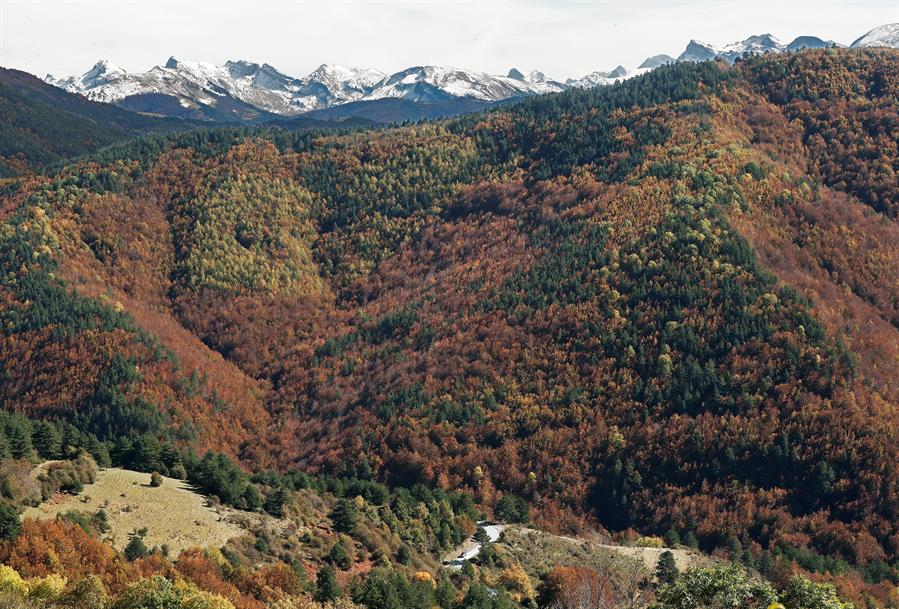Living from the forest, possible and necessary to curb climate change
Living from forests is possible and doing so would help to curb climate change, according to experts, who believe that exploiting them in a sustainable way would be the best way to enhance their value and guarantee their conservation while generating wealth and employment.
Since the industrial revolution, the massive consumption of fossil resources has enabled unprecedented economic development but has also caused unprecedented damage to nature.
In this context, the mantra has taken hold that sustainability means touching nature as little as possible, when what we need is for nature to become the basis of the economy, Marc Palahí, director of the European Forest Institute, told Efe.
"As long as we continue to want an economy that harms nature as little as possible, we are not doing well. We must ensure that both energy and products made from fossil resources come from sustainable management of 'bio' resources," he said.
Replacing oil with wood
Technology, he stressed, already makes it possible to replace petroleum derivatives, such as plastics, textile fibres, chemicals, wheels, construction materials, electronic components and cosmetics, with wood derivatives.
Putting a value on forestry systems would halt deforestation, as many forests disappear due to the introduction of more profitable crops in the short term, according to Palahí, who stressed that in order to ensure the sustainability of the planet it is also essential to put an end to unbridled consumerism.
In Spain, the profitability of forests could be a "very powerful pillar" of the economy if there were a firm commitment, and he stressed that ecological transition means recognising that ecology is the new economy.
The aim is to maintain forests as carbon sinks. When their sustainable use is promoted, they will be conserved and if they are conserved "we will reduce the risk of them being lost" due to fires or pests, added Manuel Lainez, director of the consultancy firm Lainez Biotrends and former director of the National Institute for Agricultural and Agri-Food Research (INIA).
If we make profitable the use of resources such as trunks, undergrowth, branches or trees in poor condition, we will be guaranteeing the maintenance of forests and generating employment and wealth in sparsely populated areas, according to Lainez.
Only 30% of resources are harvested, half as much as in Europe.
"We must activate the use of forests to keep them in good condition and extract the surplus biomass for use," according to Javier Díaz, president of the Spanish Association of Biomass Energy Recovery (Avebion).
His sector generates some 15,000 jobs and supplies heating and hot water to 14% of the country with biomass from crop residues, sawmills, clearing or trees in poor condition or those that are removed for thinning, because when there is excess, trees compete with each other and growth is much lower.
Currently, Spanish forests generate 55 million cubic metres of wood and biomass per year, of which only about 17 million, or 30 %, are used, compared to the European average of between 60 and 70 %.
"We can double and triple the use without compromising the sustainability of the forests", according to Díaz, who stressed that 90% of the pellet factories in Spain are located in municipalities of less than a thousand inhabitants.
"Many people think that those who cut trees are bad people, but it is necessary to cut them, not only so that there is an economy around them, but also so that the forests are healthy," he said.
Timber, the basis of the economy
The wood value chain generates 150,000 jobs, according to the president of the Spanish Wood and Furniture Business Union (Unemadera), José Carballo, who warned of the need to restore and expand forests because wood will be one of the bases of the economy and is becoming scarce.
What the proposal asks us to do is to replace the carbon sequestered by forests that were buried billions of years ago by glaciations (coal, oil or gas) with newly sequestered carbon.
A tonne of pine, oak or eucalyptus can sequester the same amount of carbon as a barrel of oil, according to Carballo, who lamented the existence of the "urbanite concept" that forests should be left to manage themselves.
"Every forest needs management to ensure its resilience. What we have to be careful is that we don't cut more than we plant to guarantee its sustainability," he said, after explaining that, currently, the vast majority of furniture is made with technical wood from recycling and waste, something in which the Spanish industry is a powerhouse.
Another of the forest's uses is the resin from which turpentine and rosin are extracted, components that can be used to produce many products that are now made with petroleum and whose extraction employs around a thousand people in Spain.
Translated with www.DeepL.com/Translator (free version)
Original article: EFE Verde.
